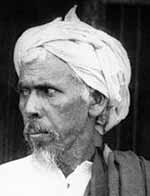Nellikkunattu Desam (Evanad Taluk – Malabar District) KERALA :
The Malabar rebellion (also known as the “Moplah War”, Mappila Lahala in Malayalam) was an armed uprising in 1921 against British authority and landlords in the Malabar region of Southern India by Mappila Muslims and the culmination of a series of Mappila revolts that recurred throughout the 19th century and early 20th century. The 1921 rebellion began as a reaction against a heavy-handed crackdown on the Khilafat Movement by the British authorities in the Eranad and Valluvanad taluks of Malabar. In the initial stages, a number of minor clashes took place between Khilafat volunteers and the police, but the violence soon spread across the region.
An estimated 10,000 people lost their lives, although official figures put the numbers at 2337 rebels killed, 1652 injured and 45,404 imprisoned. Unofficial estimates put the number imprisoned at almost 50,000 of whom 20,000 were deported, mainly to the penal colony in the Andaman Islands, while around 10,000 went missing.
Contemporary British administrators and modern historians differ markedly in their assessment of the incident, debating whether the revolts were triggered off by religious fanaticism or agrarian grievances. At the time, the Indian National Congress repudiated the movement and it remained isolated from the wider nationalist movement. However, contemporary Indian evaluations now view the rebellion as a national upheaval against British authority and the most important event concerning the political movement in Malabar during the period.
Early life and career in Mecca
Ali Musliyar was born in Nellikkunattu desom, Eranad taluk, Malabar district to Kunhimoitin Molla and Kotakkal Amina. Kotakkal Amina was a member of the famous Maqdoom family of Ponnani, known for their religions scholarship. Musliyar’s grandfather, Musa, was one of several “Malappuram Martyrs”. Ali Musliyar began his education studying the Qur’an, tajwid and the Malayalam language with Kakkadammal Kunnukammu Molla. He was sent to Ponnani Darse for further studies in religion and philosophy, under the tutelage of Sheikh Zainuddin Maqdum I (Akhir), which he successfully completed after 10 years.
He then went to Haram, Makkah (Mecca) for further education. After spending seven years in Mecca, he went on to serve as the Chief Qasi in Kavaratti, Laccadive Islands.
Musliyar in Malabar
In 1894, after learning of the slaying of his brother and several other family members, Musliyar returned to Malabar. He discovered that many of his relations and fellow students were lost during an 1896 riot. In 1907 he was appointed as the Chief Musliyar of the mosque at Tirurangadi, Eranad taluk.
The revolt of 1921–22 began following the police arrest of a number of Tenancy Association – Caliphate Movement – Indian National Congress leaders in August, 1921. Rumours that the British troops had destroyed the Mampuram Mosque led to large scale rioting throughout South Malabar against both wealthy Hindu landlords and the British.
Although the British army troops were quick to take the upper hand in many towns, a number of rebels initiated guerilla operations, forcing the British to deploy additional military units and introduce “aggressive” patrolling. The revolt came to an end in February 1922. Ali Musliyar was among a dozen leaders who were tried and sentenced to death. He was subsequently hanged at the Coimbatore Prison on 17 February 1922.
https://en.wikipedia.org/wiki/Ali_Musliyar
source: http://www.milligazette.com / The Milli Gazette / Home> Online News> Family & Kids / pub online: April 05, 2016 and print April 01-15 2016









